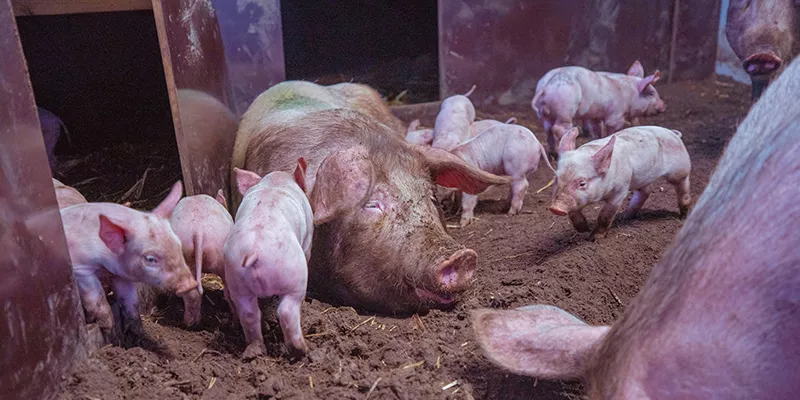Inspirational ideas: Smart barn makes for happy pigs
Innovative barn infrastructure and real-time monitoring to improve animal welfare and reduce ammonia emissions.

Consumers are calling for more affordable, sustainable pork which is produced in improved animal welfare systems. This was the context identified by the Dutch Operational Group ‘Data driven project’. The partners have developed a pilot barn concept in which the pigs are monitored in real time using ear-tag sensors so that their surroundings can be adapted to their needs.
“What is it that a pig wants?” This is the question that the project partners asked themselves. Frank Wind from the project explains “Ensuring the pigs are happy is at the core of our project. But what makes a pig happy? Pigs loves rooting, they like to build their own nest and to be in group. They are neat creatures and they like cleanliness.”
This Operational Group aimed to design a new barn concept which would be able to cater to these needs. Het Familievarken is leading the Operational Group, it is an agricultural organisation (pig industry) which focuses on improving animal welfare, costs and profit for the farmer, and impact on neighbours in terms of emissions. They teamed up with researchers from Adaptation Physiology Group Wageningen University, who are working on animal welfare as well as with technology specialists, an animal breeding company, an animal nutrition company and a consultant in animal behaviour IT. They also involved architects and construction experts.
The partners together were able to conceptualise and build a pilot barn for 48 sows, each providing 29 pigs to slaughter per year, the aim is that each sow can maintain her own healthy, long and productive life with smaller litters. Frank Wind says: “The barn offers numerous advantages for the pigs, creating a healthy and pleasant living environment”. For example, food is scattered from above at regular intervals onto the sandy floor. This means the pigs can be constantly searching for food and they never get bored. The farmers provide straw to the pigs and other materials so that they can build their own nests to provide optimal farrowing conditions. In terms of hygiene, the barn even features two different types of toilets, one for urinating and one for defecating. Due to this separate collecting, the forming of ammonia is prevented, and “We made use of the natural behaviour of the pigs. They need a safe place to go to the toilet in terms of posture and they prefer to be as far as possible from where the food is provided. We have noticed that this barn feature reduces a tremendous amount of stress for the pigs.” Frank Wind says.
Another important part of the system is that pregnant sows are put into small groups of four, “The sows support each other, feeding the piglets at the same time. Together, the mothers teach their young to root, eat, and go to the toilet.” Frank explains, “Pigs are naturally social creatures and are much happier living in a supportive group.”
On top of these barn features, the pigs each have a digital ear-tag so that the farmers can follow their behaviour. The barn environment is based on ‘a data-driven self-learning system’ meaning the farmer can adjust certain elements according to the results of data collection and analysis and the needs of the animals, a “self-learning animal housing”. The ear-tags quantify the position, speed and direction of the animal inside the barn. This data is labelled with expert observations and an algorithm predict the behaviour of the pigs in real-time. A separate system monitors the climate and other contextual data and the farmer can check animal and health information through a smartphone application. Feed, slaughter, genetic data, and energy usage is also gathered. For example, the project is working on a feeding system based on the individual needs of the animals where there is a continuous weighing system and a feedback loop to regulate feed intake.
This farm is a test version, started in 2019, in Venhorst Noord-Brabant in the Netherlands. This is a place where farmers can experiment, learn and improve. In December 2022 a symposium was organised to share results. Societal demands are more and more in favour of increasing animal welfare standards, requesting stricter indicators and monitoring methods as well as new labelling and certification systems. The EU is moving towards a ban on caged farm animals, through a proposal for revised legislation to be made by the end of 2023 as part of the Green Deal and Farm to Fork Strategy. “This Operational Group was designed with this context in mind. The project, which is the pilot phase, has now ended and plans are made to build a second farm this year to test the concept in a commercial farm situation. We have received a lot of attention from colleague farmers and we would like to share our results as widely as possible so that they may be taken up across the country, and beyond.”, says Frank.
Project information
Contact:
Tjacko Sijpkens– email: tjacko@hetfamilievarken.nl
More information:
Link to page on OG database: https://ec.europa.eu/eip/agriculture/en/find-connect/projects/data-driven-farming
Website: www.hetfamilievarken.nl